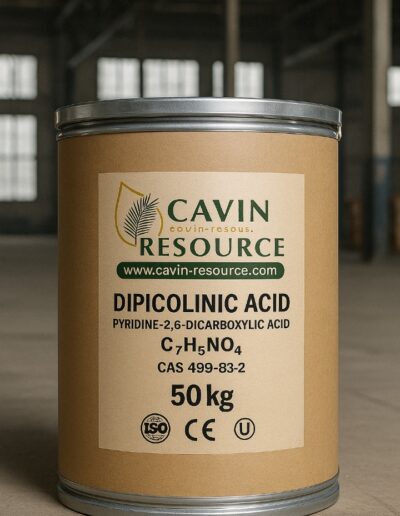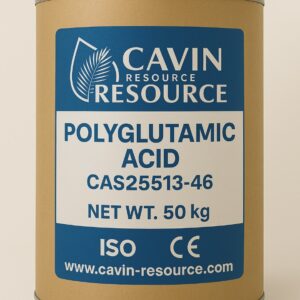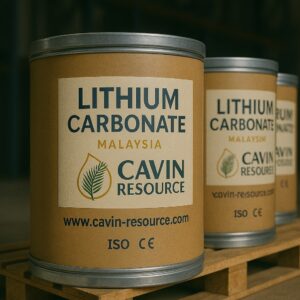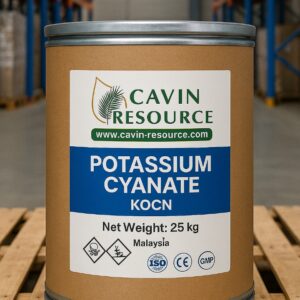Dipicolinic Acid – High-Purity Pyridine-Based Compound
Original price was: $2,100.00.$2,000.00Current price is: $2,000.00.
Dipicolinic Acid (DPA), or pyridine-2,6-dicarboxylic acid, is a white crystalline organic compound known for its role in bacterial spore resistance and stability. Widely used in biochemical research, metal chelation, polymer synthesis, and UV-curable resins, Cavin Resource offers high-purity Dipicolinic Acid in bulk, ready for global B2B distribution with compliance documentation and fast shipping.
Dipicolinic Acid (DPA), also known as pyridine-2,6-dicarboxylic acid, is a heterocyclic dicarboxylic acid derived from the oxidation of pyridine derivatives. With the chemical formula C₇H₅NO₄, it appears as a white to off-white crystalline powder and is sparingly soluble in water. It naturally occurs in bacterial endospores, contributing to their high heat resistance and dormancy.
In industrial and research applications, Dipicolinic Acid is used as a chelating agent, particularly for lanthanide and transition metals, and in high-performance resin systems. It is also valuable in UV-curable polymers, coatings, and fluorescence spectroscopy. Biochemists use DPA in assays to detect endospore presence, while manufacturers use it in stabilizers and high-durability materials.
Cavin Resource supplies DPA with consistent purity levels, technical documentation (COA, MSDS), and customizable packaging for industrial, research, and commercial needs.
⚙️ Production Method
Oxidation of Lutidine Derivatives
2,6-dimethylpyridine (lutidine) is oxidized using oxidizing agents like potassium permanganate or nitric acid.
The resulting compound is purified through crystallization and drying processes to ensure high purity levels.
🏭 Applications & Industry Use Cases
🔬 Biochemical & Microbiological Research
Marker for bacterial endospore detection
Used in fluorescence spectroscopy and genomic assays
⚗️ Metal Chelation & Complexation
Binds efficiently with rare earth and transition metals
Used in metal separation and purification
🏭 Polymer & Coatings Industry
Component in UV-curable resins, thermosets, and adhesives
Enhances thermal resistance and structural integrity
🧪 Pharmaceutical Intermediates
Precursor in API synthesis and fine chemicals
Used in experimental drug delivery systems
✅ Benefits of Dipicolinic Acid
✅ Key marker in bacterial spore detection
✅ Excellent chelating properties for rare earth metals
✅ Used in UV-resistant polymers and coatings
✅ High thermal and chemical stability
✅ Available in bulk quantities for R&D and manufacturing
✅ Supplied with global compliance certifications
📦 Packaging Options
25 kg fiber drums with liner
500 g – 1 kg laboratory-grade pouches (on request)
Custom packaging for research and industrial clients
Includes COA, SDS, TDS
❓ Frequently Asked Questions (FAQs)
1. What is Dipicolinic Acid mainly used for?
Answer: DPA is widely used in bacterial endospore research, chelating metal ions, and polymer synthesis for coatings and resins.
2. Is DPA naturally occurring?
Answer: Yes, it naturally occurs in bacterial spores, contributing to their resistance and dormancy properties.
3. Can Dipicolinic Acid be used in pharmaceutical production?
Answer: Yes, it is a valuable intermediate in the production of specialty and experimental pharmaceutical compounds.
4. What industries benefit most from DPA use?
Answer: The biotech, coatings, polymer, and rare earth processing industries are the primary users of Dipicolinic Acid.
📚 Credible Sources for SEO & Reference
Additional information
| Product Name | Dipicolinic Acid (Pyridine-2,6-dicarboxylic acid) |
|---|---|
| CAS Number | 499-83-2 |
| Molecular Formula | C₇H₅NO₄ |
| Appearance | White crystalline powder |
| Purity | ≥ 98% |
| Solubility | Sparingly soluble in water |
| Melting Point | 235–240°C |
| HS Code | 29333990 |
| pH | 2.5–3.5 (1% solution) |
| Packaging | 25 kg drums / 1 kg lab packs |
| Shelf Life | 24 months |
| Applications | Biochemical, polymers, UV resins, chelation |
| Compliance | ISO Certified, REACH, SDS Available |
| Origin | Malaysia / Export-Ready Globally |






Reviews
There are no reviews yet.